If you’ve been a thyroid patient for any length of time then I probably don’t need to convince you that magnesium is important…
But, I’m going to jog your memory just in case you needed it!
Here are a few reasons you want your magnesium levels optimized:
- Magnesium is required for over 300 reactions involving metabolism (1).
- Your body needs magnesium to produce energy in the form of ATP (2).
- It’s necessary for receptor binding, muscle contraction, neural activity, neurotransmitter release, and cardiac excitability.
- And, finally, magnesium deficiency increases your risk of developing thyroid antibodies (3).
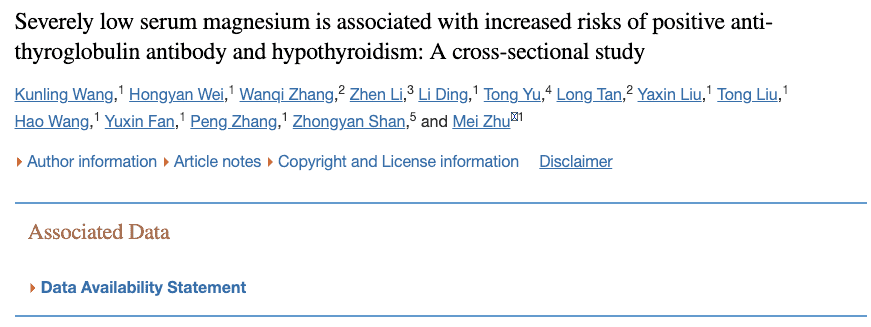
In other words, a lot of different cells need magnesium.
But, as I mentioned, most thyroid patients are aware of this which is why they are actively looking to get more magnesium into their bodies in the form of supplements!
That’s all well and good but it’s not quite as straightforward as you might think.
When you look at magnesium supplements, you’ll find that there are many different types and formulations that all provide slightly different benefits.
This means you have the chance to match the symptoms you are experiencing from thyroid dysfunction to a specific type of magnesium formulation which can provide your body with both extra magnesium and symptom control.
Make sense? Good!
Let’s talk more about magnesium, why thyroid patients become deficient in it, the best formulations to take for managing thyroid-related symptoms, and whether or not it makes sense to try and get your magnesium from food instead of supplements.
Why Thyroid Patients Need More Magnesium Than The General Population
Hold on a second, before you keep reading we need to establish whether or not it makes sense for thyroid patients to supplement with extra magnesium.
As you might have guessed, the answer is yes, but do you know why?
While it is true that magnesium is important for just about every human being, it’s arguably more important for patients with thyroid diseases (of all types, by the way).
This is because thyroid patients are at higher risk for developing magnesium deficiency compared to the general population.
Not only do they develop magnesium deficiency at higher rates, but their body also requires more at baseline from a usability standpoint.
Here’s why:
Stress is a known depletor of magnesium and because of the connection between adrenal function and thyroid function, thyroid patients are less resilient to stress.
Strike 1.
The average diet is devoid of sufficient magnesium due to modern farming techniques (4). This applies to everyone, even those eating real, whole foods.
Strike 2.
Finally, thyroid dysfunction alters magnesium excretion and metabolism (5). In other words, you could have enough in your body but your body will have difficulty hanging onto it due to how altered thyroid states impact renal retention of magnesium (in your kidneys).
Strike 3.
So, yeah, as a result of these three factors, it’s a pretty good idea to consider magnesium supplementation if you have a thyroid problem.
The question isn’t whether or not you need magnesium, but what is the best way to get it into your body?
Let’s talk about that next.
3 Magnesium Formulations to Consider & Their Benefits:
One of the great things about magnesium is that it comes bound to various compounds which impact what happens to that magnesium when it enters the body.
In other words, you can sort of direct the magnesium to specific places of the body depending on which formulation you use.
This is important because the vast majority of magnesium in your body is intracellular or inside your cells.
If you use the wrong formulation of magnesium it may stay in your intestinal tract instead of moving to your brain or muscles or wherever else you want it.
This mechanism may not sound important but it has big implications for thyroid patients when they use magnesium supplements.
Here’s why:
As a thyroid patient, you can take advantage of these various forms to try and force the magnesium to go the certain body parts based on the symptoms you are experiencing.
Have problems with constipation? No problem, there’s a magnesium formulation for that.
Want to get magnesium generally into your entire body? No problem, there’s a magnesium formulation for that.
Want to get magnesium into your brain to impact your mood? No problem, there’s a magnesium formulation for that as well.
Matching your magnesium formulation to your symptoms is also pretty easy to understand.
Here’s how to do it:
#1. Magnesium Glycinate
One big problem with getting magnesium is that it has poor bioavailability.
Bioavailability is a fancy word used to describe how easily something that you take by mouth gets absorbed and utilized by the body.
As you might have guessed, the higher the bioavailability of something, the better.
One way to improve the bioavailability of magnesium is by altering the type of compound that it is bound to (6).
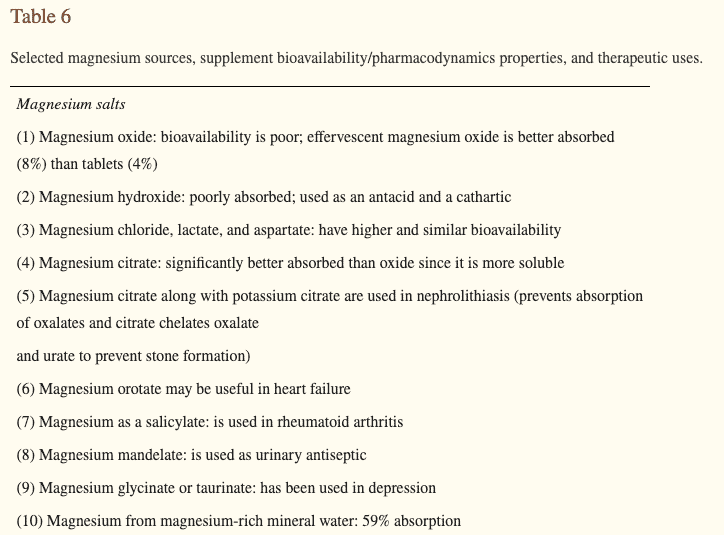
Magnesium glycinate solves the problem of low bioavailability by combining magnesium with the amino acid glycine.
For this reason, magnesium glycinate is typically the best form of magnesium to use if you are trying to get magnesium into your entire body.
This is the preferred form to use if you’ve had your magnesium level tested and found it to be low or low normal.
It’s also the form you want to use for better thyroid health and better health in general.
The dosing of magnesium glycinate varies, but most people do very well on a dose ranging from 150 to 300mg per day.
Magnesium glycinate is considered a chelated form of magnesium so other chelated versions of magnesium are also well absorbed and can be substituted in place of glycinate.
#2. Magnesium Citrate
What if you want your magnesium to stay inside your bowels or intestinal tract?
If that’s the case, then using something like magnesium glycinate or a chelated magnesium formulation is not your best bet.
Instead, you would want to use magnesium citrate.
This is because magnesium citrate, when taken in supplement form, acts to pull water into the intestinal tract.
As the water gets pulled into the intestinal tract it loosens the stool and makes which alleviates constipation.
Constipation is a symptom that plagues thyroid patients due to the impact that thyroid hormone has on peristalsis.
Even though a lot of the magnesium from magnesium citrate stays in the intestinal tract, doesn’t mean that all of it does.
You can still increase overall magnesium levels when using this form but it won’t be as effective as something like magnesium glycinate.

If you are a thyroid patient suffering from constipation and you’d like to supplement with magnesium then magnesium citrate is probably the best form for you.
The dosing of magnesium citrate is much more variable compared to the other forms we will talk about today because constipation exists on a spectrum.
The more severe your constipation, the higher the dose of magnesium you will need.
So instead of giving you a specific dose recommendation, is better to give you a titration schedule.
This allows you to find the perfect dose for your body.
You can self-titrate with 100mg or 150mg capsules of magnesium citrate, here’s how:
Start with 1 capsule and increase by 1 capsule each day until you experience loose stools.
When you experience loose stools just back down on your dose by 1-2 capsules and you will be at your ideal dose.
From my experience, thyroid patients need somewhere around 300 mg to 1,000 mg of magnesium citrate to help with constipation but I’ve seen doses in the 2,000 mg/day range in extreme cases.
Just be careful that you don’t accidentally take too much as that may result in diarrhea.
It’s not the end of the world but it’s best to avoid it if possible!
#3. Magnesium-L-Threonate
Finally, another formulation you may want to consider is magnesium threonate.
This form of magnesium is ideal for people suffering from brain-related thyroid symptoms such as depression, anxiety, mood disorders, headaches, or migraines.
Compared to other formulations of magnesium, especially magnesium sulfate, magnesium threonate is highly permeable through the blood-brain barrier (7).
The blood-brain barrier is a network of cells (8) and blood vessels designed to protect your brain from harmful substances.
Magnesium isn’t harmful per se, but it still can have trouble passing through this barrier based on what it is bound to.
Magnesium threonate is something that appears to pass through this barrier much easier than other formulations which is why it’s ideal for treating brain-related symptoms.
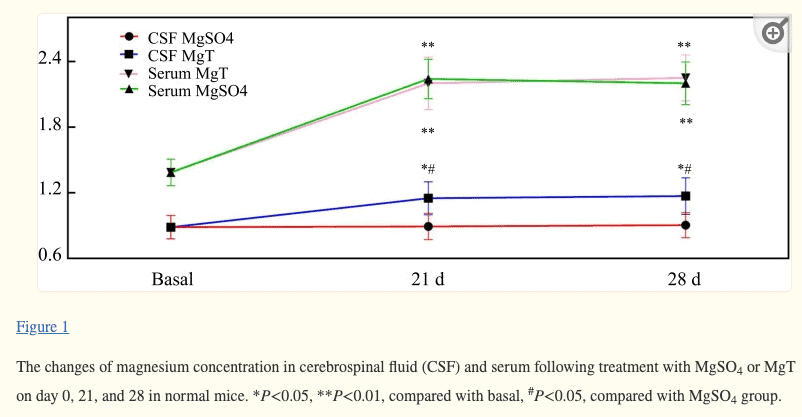
Because magnesium also tends to have a calming effect on the body, magnesium threonate can also be helpful for thyroid patients who suffer from jittery or hyperactive symptoms (nervous energy and the like).
If your thyroid is causing symptoms like anxiety, depression, or mood disturbances, then this form of magnesium would probably be best for you.
For best results, aim to use 2,000mg of magnesium threonate each day.
Getting Magnesium From Foods
Some people prefer to get their nutrients from foods and, if that’s you, then this section will be particularly helpful.
Before you opt to get your magnesium from foods, though, there are a few things you should know:
- Only about 30-40% of dietary magnesium is absorbed by the body. This means you will need to plan to eat probably a lot more food than you are thinking to get the same amount from supplements.
- It’s often much easier to get magnesium from supplements because, at the end of the day, taking 1-2 extra capsules is easier to get down than 1/2 a cup of spinach or a serving of chia seeds.
- Some foods high in magnesium may not be palatable to you personally! But if you can find foods that are naturally high in magnesium that you also love and enjoy eating then more power to you.
- Some foods high in magnesium may not be ideal for those with thyroid disease because the food itself may cause more harm than good. An example of this would be magnesium-fortified cereals which contain gluten and wheat. Other foods such as beans and legumes may cause intestinal bloating and gastric distress if you already have problems with your digestion.
Having said all of this, it’s still a perfectly fine strategy to get your magnesium from foods if that’s your goal, as long as you stay consistent in eating the right foods.
Foods that are naturally high in magnesium include (9):
- Pumpkin seeds – 156mg/serving
- Chia seeds – 111mg/serving
- Almonds – 80mg/serving
- Spinach – 78mg/serving
- Cashews – 74mg/serving
- Peanuts – 63mg/serving
- Shredded wheat cereal – 61mg/serving
- Soymilk – 61mg/serving
- Black beans – 60mg/serving
- Edamame (shelled, cooked) – 50mg/serving
- Peanut butter (smooth) – 49mg/serving
- Potato (baked) – 43mg/serving
- Banana – 32mg/serving
- Salmon (farmed Atlantic) – 26mg/serving
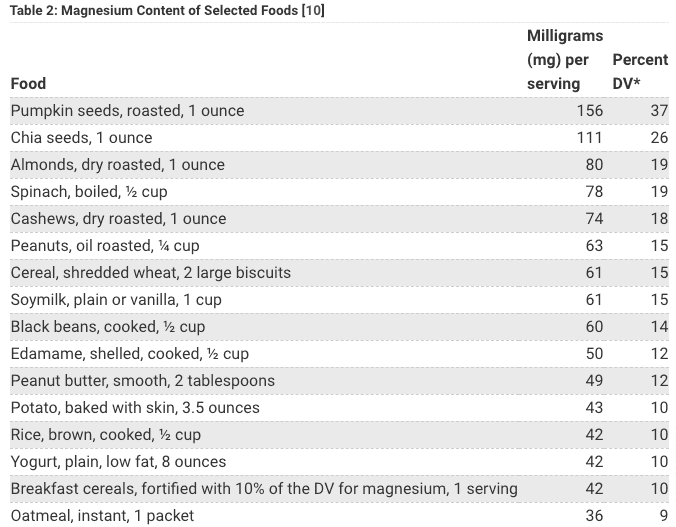
Instead of focusing just on magnesium supplements or just on magnesium-rich foods, I think it makes sense to use a combination of both.
Try to eat as many magnesium-rich whole foods as you can (which are palatable to you) while using over-the-counter magnesium supplements to make up the difference as needed.
This strategy will allow you to get other nutrients found in food while also helping to manage your thyroid symptoms.
Back to You
Magnesium is a crucial mineral that just about every patient with thyroid disease should be aware of.
Thyroid patients can use specific magnesium formulations to help control and manage some of their thyroid-related symptoms.
Based on my experience, the best way to optimize magnesium levels is through the use of a combination of food sources and natural dietary supplements.
Now I want to hear from you:
Were you aware of the importance of magnesium in the entire body? What about your thyroid gland?
Are you currently taking magnesium supplements? If so, what form are you taking?
Have you tried matching your magnesium formulation to your low thyroid symptoms? If not, are you planning on giving it a try?
Leave your questions or comments below!
Scientific References
#1. ncbi.nlm.nih.gov/pmc/articles/PMC4455825/
#2. ncbi.nlm.nih.gov/pmc/articles/PMC4960558/
#3. ncbi.nlm.nih.gov/pmc/articles/PMC6028657/
#4. ncbi.nlm.nih.gov/pmc/articles/PMC7649274/
#5. pubmed.ncbi.nlm.nih.gov/3336286/
#6. ncbi.nlm.nih.gov/pmc/articles/PMC5637834/
#7. ncbi.nlm.nih.gov/pmc/articles/PMC6857673/
#8. ncbi.nlm.nih.gov/pmc/articles/PMC4292164/
#9. ods.od.nih.gov/factsheets/Magnesium-HealthProfessional/
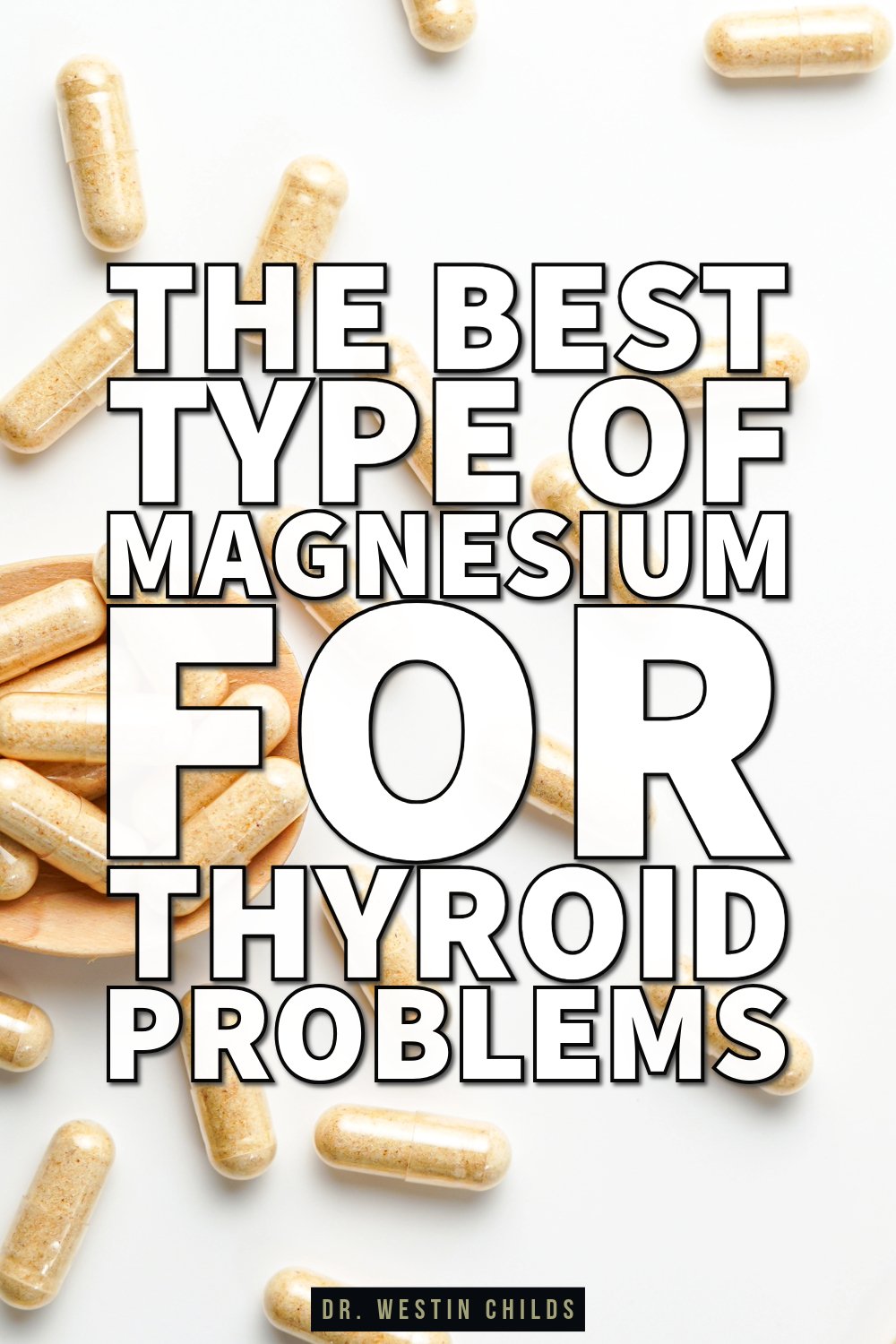
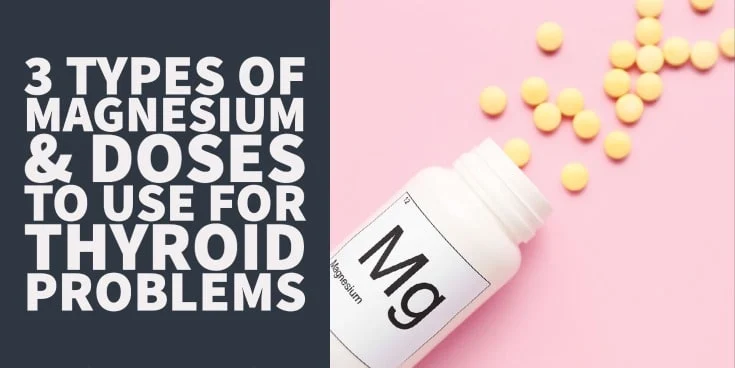

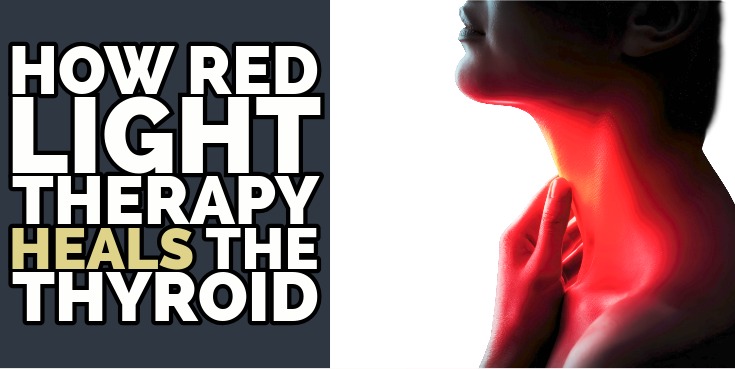



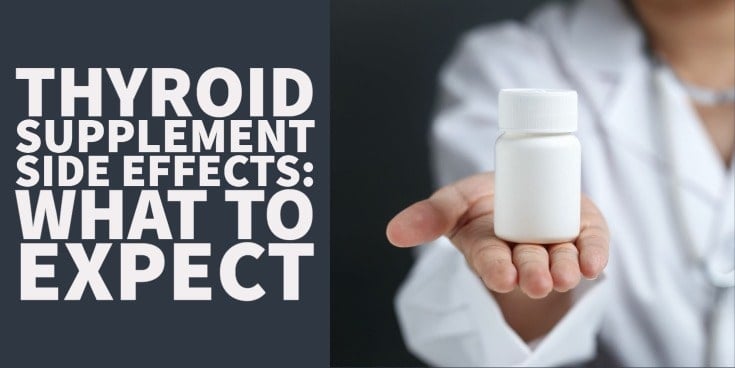
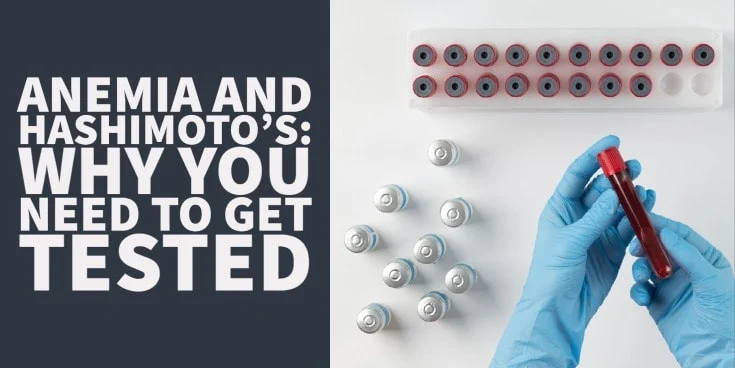

I use magnesium malate because it’s recommended for those of us dealing with histamine intolerance in addition to hypothyroidism, etc..
Hi Ann,
Magnesium malate is a good form to use as well.
Please which form of magnesium is best to cure osteoporosis? I seen YouTube videos from doctors saying it’s good for osteoporosis, but they don’t specify which type of magnesium. Thanks, Fran
Hi Francia,
Magnesium glycinate would be a good option for bone support.
I have been off levothyroxine for 2 months what I didn’t expect was to feel as good as I do I thought the withdrawals were going to be what I read my blood pressure has gone up in the begining it’s barely started to come down I do sleep much better I have energy and joint pains gone I’m not saying I’m a 100percent I’m just saying I feel good considering the length of time I’ve taken this medicine with my Dr continuously raising the dose throughout the years I will continue to monitor with my new Dr who has been very supportive and I can only hope and pray that it will all work out in the long run thank u Dr Westin it was your blog that gave me the courage and the want to take on this challenge
Hi Lanette,
Glad to hear you are doing better now! Thank you for sharing and glad I could be of some assistance.
I was diagnosed with Hashimitos this year 2022. I started 50g on Levo med. I have removed Gluten and have lactose free milk. my diary intake thru life has been low. I take Omega 3, Selenium at night. I am also on 20g of pravacol cholesterol lowering meds since Dec 2018. I’ve started taking Magnesium Chelate at night. I’m not sure if this is the best for Hashimitos. What is the best time to take all these supplements.. ? at AM I take Levo. I take omega 3 at lunch In evening I take my cholesterol tablet. and normally Selenium before bed..and Magnesuim an hour later..I am going to start in Zinc..but when do I take this? I eat well, salmon each week, mainly salads with tuna tins or salmon at lunch. I’ve reduced sugar. I have masala tea mainly, or owling and ginger tea..no sugar. One coffee a day.. I am just keen to take supplements at the right time and reduce inflammation. I have two small patches..vitiligo on my inner thighs.. what more should I be doing or avoiding? thankyou Tracey
I believe that I have Hashimodos. My labs are normal yet I have all the symptoms. A while back I tried NDT and felt great. I added high dose Iodine and felt like I was on speed. The only problem is that my throat swelled up. I didn’t have trouble breathing but did have trouble swallowing.
Here’s my experience with magnesium-diarrhea. I was unable to take a full serving of fizzy calm without liquid BM. I couldn’t tolerate the Picometer (you know what I mean) magnesium either. For me, I had to switch to Sustained Time Released magnesium. And I had to start low and titrate up. A single 125 mg tablet and gradually increased over time. I now take 700 mg per day. Staying balanced is tricky. At that dose, I need to pop hyper probiotics like candy and keep my vitamin D in a tight range.
Too much vitamin D gives me severe leg cramps, anxiety, and wicked bad oily skin. And intractable insomnia. At full titration I was able to gulp down a whole bottle of wine and it didn’t phase me. Laying off the D for a while cured that. Too low and I feel tired, depressed and every joint in my body screams in agony.
Under Section “#2. Magnesium Citrate” above, you make the statement: “If you are a thyroid patient suffering from constipation and you’d like to supplement with magnesium then magnesium glycinate is probably the best form for you.” I can understand if this is an error in print but, if you really meant “glycinate” is the best form for constipation when the rest of Section #2 explains why “citrate” is superior, can you explain your logic?
Hi M. J.,
Sorry for the confusion, the original statement should read: “If you are a thyroid patient suffering from constipation and you’d like to supplement with magnesium then magnesium citrate is probably the best form for you.”
It has been corrected in the article itself and it should now make a lot more sense. For clarification, glycinate is better for replacing general whole-body magnesium and citrate is better for those with constipation.
I’ve been reading about different kinds of magnesium and it’s different functions in the human body. I found it very educational for me. I’ve been taking magnesium for my muscle cramping not so familiar with the other kind. I had thyroidectomy, I’ve been suffering from brain fog, low levels of thyroid so I might need to take magnesium glycinate and L- Threonate.
Hi Lorie,
Yep! You are on the right track!
Hello,
I have hyperthyroidism.Im trying to find out which Magnesium would be the right one for me?
Thank you
Hi Kim,
This information mostly applies to hyperthyroidism as well but if you weren’t sure where to start then magnesium glycinate would be a great option.
Dr
Westin Childs thank you for all you do. I was diagnosed with hypothroid in 2006 by a dr I saw one time. I did not know what thyroid was at that time so I took meds as prescribed. I move away an doctors kept me on meds. I have 3 sisters and none of them have thyroid issues. I wonder if I was misdiagnoised. I had no health issues or took any meds till levothroxine. I have a hard time taking the meds. I later got a hianal hernia in chest. I am on 75mg but I only take about one half of that because I hurt so bad and I feel way off if I take more. Please advise. I would love to stop but afraid to. Thank you so much.
Hi Betty,
If you are interested in getting off of your thyroid medication then I would strongly recommend reading this article first: https://www.restartmed.com/how-to-get-off-of-thyroid-medication/
What if you have Grave’s disease, are s/p radioactive Iodine uptake and take levothyroxine every day, have depression, anxiety and are obese. Thankfully no constipation problems. Should one take glycinate or or L-threonate or both?
Hi Christie,
It would be a good idea to try one and then the other to see if one works better for your personal situation. You can’t go wrong with either.
Dr Hi Childs,
Can you clarify the sentence “From my experience, thyroid patients need somewhere around 300mg to 1,000mcg of magnesium citrate to help with constipation but I’ve seen doses in the 2,000mg/day range in extreme cases.”
Did you mean 1,000 mg? I had been taking 500 mg of magnesium citrate and developed palpitations when I didn’t have them before. I have bad muscle spasms, constipation, and a whole lot of other things. I’m a 60 year old female who had a total thyroidectomy for Papillary cancer in 2015. I’ve read magnesium can be fatal in large amounts. I was happy with how it was working for my constipation but the heart palpitations scared me so I cut back to 250 mg. Do you have any thoughts and can you clarify the dosage you quoted above?
Thank you!
Hi Linda,
It should read 300 to 1,000 mg (not mcg). I’ll fix it! Thanks for pointing it out.
Very helpful article. Can you use all three forms?
When would the best times in the day to take each supplement to not interfere with my BP throid meds?
Thanks!!
Hi Cassy,
You could if you wanted, yes.
I’ve used topical magnesium for years. I found when I first started taking it, it made a huge difference for the anxiety I was experiencing. Do you think this is a good way to get magnesium or is it better to take it in a supplement form. I have a lot of digestive issues so I am always wondering how much of any supplement I take that actually gets absorbed. Thanks!
Hi Roseanne,
I prefer the oral route but you can definitely get some absorption transdermally.
If you are eating foods that supply magnesium, which magnesium variety is it? Citrate, Glycinate…? Thank you!
Dr Child’s – I have not been diagnosed with hypothyroidism. I only have 1/2 my thyroid left and it has a benign mass. The right side had a mass and was removed. I was not aware of the role magnesium plays in the human body and have never been tested for low magnesium. I take Rx Vitamin D and the 3 thyroid tests have come back normal. I have been unwell for about 2 1/2 years. Symptoms are many but headache, mental forgetfulness, hair loss, nails splitting and ridges, hot spells, constipation, fatigue, depression, anxiety to name a few.
I have read everything you’ve had to say. I think I need some advice.
Debra
What about magnesium carbonate from the Calm brand? I use it as a tea at night to relax. You use 1-2 tsp depending on your gastrointestinal tolerance.
Since losing my thyroid gland 15 years ago, I have found I need lots of magnesium. If I am low I get cramps, migraines, heart palpitations, muscle soreness and joint stiffness. After much testing of different types of magnesium and dosages I have found my perfect balance. In the morning I take a Magnesium complete tablet (these contain mag orotate, gluconate, chelate and mag phosphate pentahyrate). At lunch time I take 15 drops of natural magnesium liquid (mag chloride and sulphate) and in the evening I take a capsule of mag glycinate 50mg. Since taking this combination I no longer get the above symptoms and it’s not enough to give me loose stools. Thanks Dr Westin, your article is very helpful.
Caroline,
It’s great you found your best magnesium forms. Mind mentioning the brands of all Magnesium you take throughout a day?
Hi doctor,im luisa styer,got hashimoto,heavy hypertension and constipation,i stop levo,really is a bad,losing lots hair,skin like sand paper,not sleeping well. I stop gluten. Can i use magnesium? I know one from Ana María La Justicia,from Spain,she is famous for this. My doctor changed my Coveram medication for BP and really put me more sick,dont know what to do nomore,i know is the hashimoto can produce hypertension. Will help to use magnesium? Im from southafrica, difficult to find ur products here. Will be ok. The Colageno with magnesium? Carbonate of magnesium hidrolized.thats the name of magnesium in power i got. Thanks doctor,u really help us a lot.
Please discuss how to deal with Amiodarone-induced hypothyroidism in your YouTube.
What type of magnesium is preferred in this case ?
Hi Chison,
I will add that to the list of future topics.
I was diagnosed with Hashimoto’s many years ago and have been on medication for many years. I recently went through a difficult time with my thyroid getting up to 3 times the level is should be. Was taken off all thyroid medication, supplements including magnesium etc. for a number of weeks then put back on a lower dose of Eltroxin, still not back on supplements. Being on thyroid medication should I also be taking magnesium? I live in Canada so not sure if the Eltroxin is similar to what is available in the USA. I felt better when taking supplements but don’t want to push my thyroid levels up to 3 times higher than they should be. That was very difficult.
Hi Margie,
You can take magnesium in combination with thyroid medication, just not at the same time.
Hi – I take magnesium taurate as I have atrial fibrillation as well as thyroid issues (Hashimotos and Graves) and the taurate is recommended for heart issues. My thyroid is well regulated with levothyroxine and NDT, plus LDN. Is it ok to continue with the magnesium taurate?
Thank you.
I’m curious if you combine all three, would you take the recommended dose of each? Or would you somehow include all three types under one dosage (say 300mg combined)? Also, is there a ‘best time of day’ to take magnesium in general?
Hi Becky,
You would have to figure out the dose based on your bowel movements. If you develop loose stool then you’d back off on the dose.
Hi Dr Childs . I have radiation induced hypothyroidism, as a result of right sided cancer of a tonsil root being left in when i had my tonsils removed at age 7 , now 69 . Had the operation age 61. I take 50mg levothyroxine daily but I’m still experiencing brain fog , could fall asleep easily each time I sit down . Headaches sore joints etc. What magnesium should I be taking. Not taking any ATM, have bloods done every 3months, was on iron supplements for awhile now iron good apparently. But still tired all the time, please advise. Many thanks cheers Liz
I have low blood pressure and when I took magnesium after a while I kept having spells of nearly passing out. I was taking 200 mg magnesium glycinate a day. I have low thyroid and take 75 mcg Levo. I feel I may need magnesium because of jittery nervous energy and irregular heartbeat but have been afraid to take it since. Believe it lowered my blood pressure too much.
Hello Dr. Childs,
I take your supplements, and they have helped me throughout the years.
I have Hashimoto’s for about 20 years, and I just started to take Magnesium in the form of Magnesium Oxide in combination with Calcium malate at night.
Hello,
Can I take Magnesium Glycinate and Magnesium Citrate together? I need relaxation and I have problems with stool. Please advise. Thank you!
Hi Laxmi,
Yes, they can be used together.
Happy Sunday. My thyroid levels were low. No medication were issued. I never took magnesium supplements before. Did some reading and found out magnesium supplements is good to normalize your thyroid. I started taking magnesium citrate. I felt a difference in about 1 week. I also suffered from insomnia because of menopause. Since taking magnesium I haven’t had insomnia. So recently I read that magnesium citrate is better for people who suffers from constipation or digestive problems. I do go restroom first thing in the mornings since incorporating magnesium citrate. Am I taking the correct magnesium supplement? I want a magnesium supplement that will be beneficial to my whole health. I did gain weight in the last 3-4 months. What’s the best one to use? Blessings.
Hi Gerian,
Magnesium glycinate is my preferred form for thyroid support which is why I use it in most of my supplements.
I just have a thyroid goiter anxiety some constipation or slow digestion which for would u recomend
Id like your take on mag taurate and also on Mother Earth Minerals Angstrom Minerals Magnesium for better absorption for high blood pressure and afib and jitteriness and anxiety…..? felt not being absorbed well so trying the angstrom instead with a side of taurine..HT in the past but now just have low thyroid… antibodies normalized but still hypo… No longer take NDT at all at age 73. TSH stays at about 7..what do you think?
Hi Dr Childs, thyroidectomy 2020, im 67 and still struggling trying to raise my t3 as only on t4 medication as I cant get prescribed t3. In uk. I have started taking Magnesium glycinate which is a 997mcg chew tablet is this too much and should i break them up.